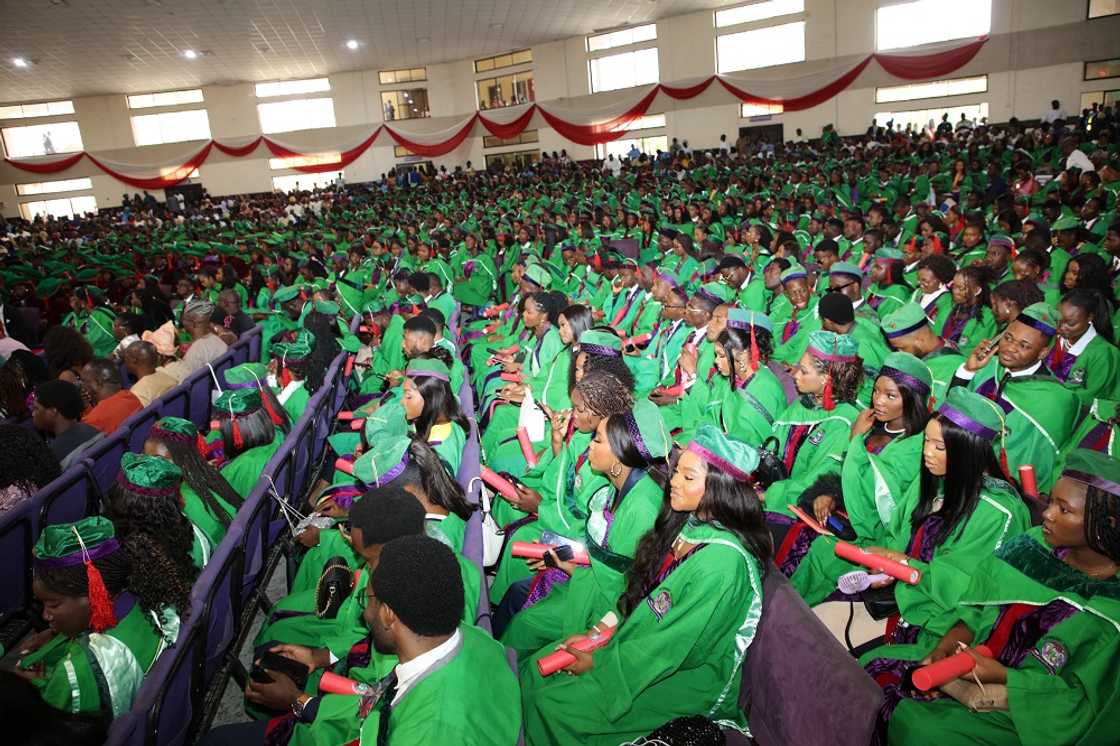Covenant University Shows Courses with the Highest and Lowest School Fees, Mentions Amount
- Covenant University has released the official tuition fees for the 2024/2025 academic session, showcasing the highest and lowest costs across its programmes
- Engineering courses were most expensive at ₦1,747,200, while courses like Industrial Relations and Marketing were among the most affordable at ₦1,452,450
- This tuition structure reflected the university’s dedication to delivering quality education across various disciplines while maintaining accessibility for students
Covenant University has announced the approved tuition fees for the 2024/2025 academic session, outlining the highest and lowest costs across its diverse programmes.
The College of Engineering had the highest fees, where students pursuing degrees in Chemical, Civil, Computer, Information and Communication, Electrical and Electronics, Mechanical, and Petroleum Engineering were required to pay ₦1,747,200.

Source: Twitter
On the other hand, the most affordable courses were Industrial Relations and Human Resource Management, alongside Marketing, both offered under the College of Management and Social Sciences, with a tuition fee of ₦1,452,450.

Read also
Redeemer’s University shows courses with the highest and lowest school fees in 2025, mentions amount
Breakdown of Covenant University's tuition fees
Covenant University has structured its fees based on various colleges and programmes.
In the College of Leadership Development Studies, English, Policy and Strategic Studies, Political Science, Estate Management, Industrial Chemistry, and Biology all had tuition fees set at ₦1,507,650.
Psychology and Management Information Systems were slightly higher at ₦1,638,750. International Relations and Computer Science had a fee of ₦1,704,300.
In the College of Management and Social Sciences, Accounting, Finance (Technology), and Mass Communication carried a tuition fee of ₦1,704,300, whereas Business Administration was slightly lower at ₦1,578,750.
Economics was priced at ₦1,641,900, and Finance at ₦1,573,200. Meanwhile, Industrial Relations and Human Resource Management, as well as Marketing, had the most affordable tuition fees at ₦1,452,450, while Sociology stood at ₦1,515,600.
Engineering courses in the College of Engineering had the highest school fees, requiring students pursuing degrees in Chemical, Civil, Computer, Information and Communication, Electrical and Electronics, Mechanical, and Petroleum Engineering to pay ₦1,747,200.
In the College of Science and Technology, Architecture, Computer Science, and Industrial Mathematics were priced at ₦1,704,300, while Biochemistry, Industrial Physics, and Microbiology stood at ₦1,584,288. Building Technology required ₦1,573,200, and Industrial Mathematics cost ₦1,650,300.
The breakdown of course fees can be seen on the university's website.
Covenant University’s tuition structure demonstrates its commitment to delivering high-quality education across multiple disciplines, ensuring students have access to world-class academic programmes that align with their aspirations.

Source: UGC
Quality education should not be luxury - Analyst
Education policy analyst, Folaranmi Ajayi, shared his thoughts on the tuition structure of Covenant University, calling attention to its potential implications for educational equity in Nigeria.
"Reading Covenant University's tuition structure over the weekend, one cannot help but admire the institution's ambition for quality education," Ajayi told Legit.ng.
Raising concerns about its long-term sustainability and the risk of reinforcing class divides, he acknowledged the critical role of private universities like Covenant, which"are filling crucial gaps in Nigeria's higher education system by offering stable academic calendars, state-of-the-art facilities and a values-driven approach."
"These come at a premium," he noted, citing the ₦1.7 million tuition for Engineering students, which he deemed "justifiable given the infrastructural demands of such courses."

Read also
EFCC arrests 3 suspects behind Q-net university scam, “offers fake degrees in medicine, nursing”
However, Ajayi pointed out that the high tuition fees are a barrier for many Nigerians, particularly in light of the country's "economic instability, a shrinking middle class, and high youth unemployment."
He added that while the fee variations across courses, ranging from ₦1.45 million for Marketing to ₦1.74 million for Engineering, show some internal differentiation, "the broader picture remains one where affordability continues to limit access."
Ajayi raised critical questions about Nigeria's educational system:
"Are we building a system where brilliance without financial means leads nowhere?"
He also warned that such high fees might encourage a brain drain, as talented students seek more affordable education abroad.
"Private institutions should not be criticised simply for charging what sustains their operations," he acknowledged, but emphasized that they should also invest in "scholarships, flexible payment structures, and engaging in public-private partnerships."
"Quality education should not be a luxury," he concluded, stressing that it ought to be "a right, accessible to every aspiring Nigerian mind."
First-class graduate advises fellow students
Legit.ng earlier reported that Bamigbaye Habeeb Olalekan, a recent graduate of Obafemi Awolowo University (OAU), emerged as a top achiever with an impressive CGPA of 4.61/5.00 in Quantity Surveying.
Reflecting on his academic journey, he credited his success to balancing his studies with exploring additional skills like web development, data analysis and designing, before he specialised in motion design.
Olalekan explained that this holistic approach to his education and experiencing a range of courses as a university student allowed him to enhance his personal growth and pursue further academic excellence.
Editorial assistant Ololade Olatimehin provided exclusive commentary from a education policy expert for this report.
Proofreading by Bruce Douglas, copy editor at Legit.ng.
Source: Legit.ng



